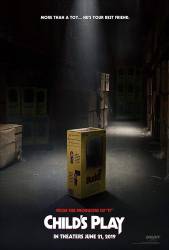Plot hole: Since the "Buddi" doll is designed simply to be a child's toy, able at most to carry items like a book or a banana, and Chucky in this movie is not a supernatural creature, it's hard to explain how it is strong enough to, for instance, carry the heavy watermelon across town and lift it in position. Even if his safety locks have been removed, a toy designed to be in the crib with toddlers wouldn't be built with the kind of lifting power shown here (we also see it assembled and it does not have a terminator skeleton or something like that, it's mostly plastic).
Plot hole: Karen forbids her son from playing with Chucky, because he's spending too much time with it on top of it scaring the cat, and locks it up in a cabinet. The cabinet ends up broken (Chucky broke it but she does not know), the cat conveniently disappears (Chucky killed it but she does not know), but the mother is totally cool about it, the plot point is forgotten and Andy faces no punishment or questioning for it. Any mother would be alarmed and would make a big deal of it possibly even throwing the doll away (she does not care, she did not pay for it), but that sort of drama is delayed until much later in the movie, for no internal reason.
Plot hole: The Vietnamese sweatshop is structured in a way that makes no real sense: the workers seem to be randomly in charge of everything and nothing instead of having specialized, streamlined tasks. Already makes no sense that a low level employee would be able to reprogram a state of the art AI chip, it makes even less sense from a production standpoint that he'd also be given a disassembled doll, dress it, etc.






Answer: I wouldn't read into it much more than just a joke: Chucky heard that joke earlier when the kids in the street were trying to make him do things for their cell phone cameras. So he just re-used it later as he often does in the movie.
Sammo ★
It was a joke that some kid said when he had the Chucky doll.